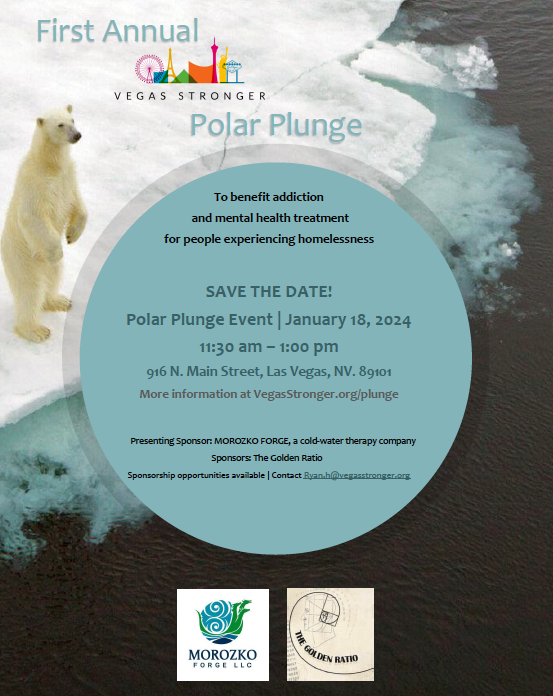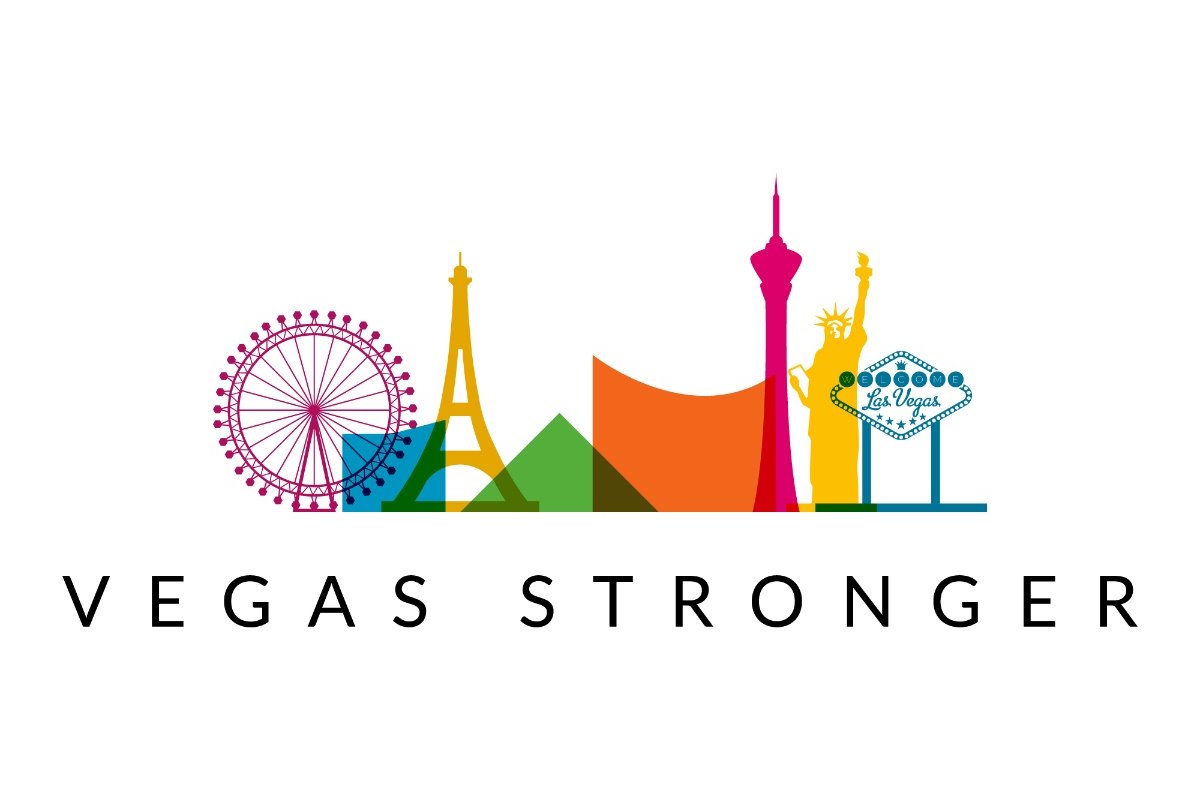There are many forms of therapy that can have a tremendous impact on mental wellness. One you might not expect? Taking a plunge into freezing water. But that's exactly the type of out-of-the-box thinking we like to use at Vegas Stronger™. To support our efforts, we launched our first Annual Polar Plunge on January 18th, 2024!
Read on to learn more about cold immersion therapy and how we use it as part of our transformative addiction recovery program for people experiencing homelessness in Las Vegas. If you're interested in supporting people to overcome homelessness and addiction at future Polar Plunge events.
What Is a Cold Water Plunge?
Cold water plunges are often called polar plunges. You may already see people take part in these challenges when they race into frigid waters on New Year's Day. This is a tradition that dates back 120 years, and the act has a much longer history.
Cryotherapies, including ice water immersions, have been a long-standing form of treatment for various injuries over the years. Hippocrates and Plato even talked about the benefits of cold water on the body in Ancient Greece.
Over the last 200 years, doctors have studied the effects of cold water on the mind and body. In 1842, the world's first "Water Cure" facility opened in Malvern, England, and Victorians used to flock from far and wide to plunge into the waters.
Now, cold water immersion is scientifically understood to raise mood-enhancing hormones and neurotransmitters that contribute to mental wellness. It may also improve circulation, lower inflammation, and help build resilience.
The Link Between Cold and Mental Health
There are numerous causes of mental illness, which also fuel substance use disorders. Someone who has both a substance abuse problem and a mental health disorder has a dual diagnosis. While each condition is distinct, they interact with one another. Think about the role alcohol can have on depression and vice versa. Someone struggling with schizophrenia may turn to drugs as a way to self-medicate, only to have these substances lead to worse symptoms.
The interplay between addiction and mental illness is important when creating a program that truly makes a difference. That is why we do far more than offer financial aid to unhoused people in Las Vegas. We tackle homelessness by getting to the root causes and then offer people comprehensive treatment plans to improve their lives.
Our approach to holistic healing includes surprising treatments like cold immersion, which participants can sign up for. Taking on a challenge like this helps prove to people that they can overcome difficulties through determination and resilience.
Resilience is a major focus of cold immersion. It shows people that pushing through pain and discomfort can have long-lasting benefits to their mental health.
What Science Says
In 2016, Dr. Rhonda Patrick stood before a crowd in Helsinki, Finland, at the Biohacker Summit. She spoke in-depth about the health benefits of sauna therapy and cold exposure, which was later written about in a post by the Mental Health Center of America.
Many people report feeling invigorated and rejuvenated after a polar plunge, but why? It's linked closely to the neurotransmitter norepinephrine, which affects mood, vigilance, attention, and more.
The brain releases large amounts of norepinephrine in response to stress or danger. While the Annual Polar Plunge isn't dangerous, the body still treats delving into icy waters as a threat. However, it translates this as a type of "good stress" that ultimately activates the brain's natural stress regulation system.
Norepinephrine is produced with feel-good hormones called endorphins, which lead to feelings of positivity, accomplishment, and general well-being. Similar to how people can feel empowered and energized after a workout, polar plunges take this to the next level.
There are 11 primary benefits:
· 1. Increases Energy Levels
· 2. Triggers Hormesis and Improves Resilience
· 3. Speeds Up Physical Recovery
· 4. Improves Your Discipline
· 5. Boosts Your Mood
· 6. Helps You Better Manage Stress
· 7. Improves Your Sleep
· 8. Helps Burn Fat and Improve Insulin Sensitivity
· 9. Boosts Your Immune System
· 10. Offers Neurocognitive Benefits
· 11. Improves Your Cardiovascular Health
A Combined Approach to Addiction Recovery
While we are passionate about finding ways to help people with unique methods, we also recognize the importance of consistency in any drug or alcohol treatment program. As with mental health therapy, addiction requires ongoing assistance and accountability to be successful. That is why we partner with everyone who walks through our door with a dedicated counselor and case manager to help them recover. More than simply getting clean, we want people to develop the skills they need to stay off the street and build a life they love to live.
We employ a wide range of therapies to make people's lives better and their mental health struggles more manageable. Below are some of the basic types of therapy that we use to help people overcome their struggles.
Cognitive-Behavioral Therapy
CBT is one of the most widely studied and clinically researched forms of mental health counseling. It has been successful in helping patients overcome many different struggles, ranging from depression and anxiety to post-traumatic stress disorder and substance abuse.
The underlying principle that guides CBT treatment is the belief that changing thoughts changes actions and vice versa. When patients understand why they do unhelpful behaviors and the types of thoughts that contribute to them, it becomes easier to start thinking critically and making positive changes.
Dialectical Behavior Therapy
DBT is a type of therapy similar to CBT that incorporates elements of mindfulness and Buddhist philosophy. DBT can help patients cope with a wide range of serious mental health disorders as well as substance abuse.
This evidence-based treatment is optimized to reduce self-harming thoughts and urges and self-sabotaging behaviors and increase distress tolerance. By cultivating resilience through DBT, many patients who struggle with self-destructive behaviors, like addiction, can find freedom.
Motivational Enhancement Therapy
When someone is struggling with a mental illness or substance abuse problem, they are not always inspired to change. Coupled with being homeless, it is common for many people to feel they're too far gone and have no hope for lasting change. Motivational enhancement is a therapeutic technique that meets people where they're at to help them improve. Rather than push back against resistance, it aims to help people identify opportunities and recognize that even if they aren't ready to accept change, the potential is still there.
Mindfulness-Based Stress Reduction
Can you imagine life without a home, living on the street, struggling with mental health and addiction? The stress levels of being homeless cause many people to turn to drugs and alcohol as an escape. Stress itself becomes a major trigger for people, which is why learning how to cope and manage distress is so important.
Mindfulness-based stress reduction helps people build skills that teach them to focus on the present moment, let go of unhelpful thoughts and attachments, and gradually lower their stress levels to maintain a healthy emotional baseline.
How to Survive Your First Plunge
More About This Year's Plunge
We never settle for anything but the best for the people we help. That's why we're thrilled we hosted this year's plunge with Morozoko Ice Baths on January 18th. The company creates personal cold immersion chambers that make their own ice and guarantee a rejuvenating experience.
Click here to learn more!

Video by Granville Stewart.





